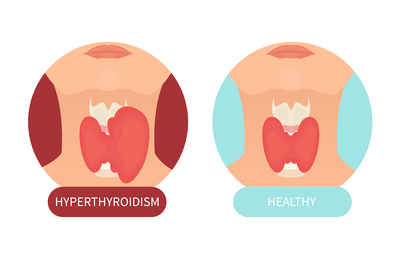Hyperthyroidism is a thyroid disorder characterized by an overactive thyroid gland, leading to excessive production of thyroid hormones. Understanding the symptoms, causes, and treatment options for hyperthyroidism is essential for managing this condition and maintaining overall health.
Symptoms of Hyperthyroidism:
Hyperthyroidism can manifest in a variety of symptoms, including unexplained weight loss, rapid heartbeat (tachycardia), sweating, trembling hands, anxiety, irritability, and difficulty sleeping. Individuals with hyperthyroidism may also experience heat intolerance, frequent bowel movements, fatigue, and muscle weakness. In some cases, hyperthyroidism can lead to eye problems such as bulging eyes (exophthalmos) and vision changes.
Causes of Hyperthyroidism:
The most common cause of hyperthyroidism is Graves’ disease, an autoimmune disorder in which the body’s immune system mistakenly attacks the thyroid gland, stimulating it to produce excess hormones. Other causes of hyperthyroidism include thyroid nodules or goiter, which are noncancerous growths on the thyroid gland, and thyroiditis, inflammation of the thyroid gland caused by viral infections or autoimmune conditions.
Risk Factors and Complications:
Several factors can increase the risk of developing hyperthyroidism, including family history of thyroid disorders, being female, and age (hyperthyroidism is more common in individuals over the age of 60). Complications of untreated hyperthyroidism can include heart problems such as atrial fibrillation and congestive heart failure, osteoporosis, and thyrotoxic crisis (thyroid storm), a life-threatening condition characterized by severe symptoms of hyperthyroidism.
Diagnosis and Treatment:
Diagnosing hyperthyroidism involves a combination of physical examination, blood tests to measure thyroid hormone levels (T3, T4) and thyroid-stimulating hormone (TSH), and imaging tests such as thyroid ultrasound or radioactive iodine uptake scan. Treatment options for hyperthyroidism may include medications to block the production of thyroid hormones (antithyroid drugs), radioactive iodine therapy to destroy the thyroid gland, or thyroid surgery (thyroidectomy) to remove part or all of the thyroid gland.
Managing Hyperthyroidism:
Managing hyperthyroidism requires ongoing monitoring and treatment to regulate thyroid hormone levels and alleviate symptoms. In addition to medical interventions, lifestyle modifications such as stress management, regular exercise, and a balanced diet can help support thyroid health and overall well-being. It’s essential for individuals with hyperthyroidism to work closely with their healthcare provider to develop a personalized treatment plan that addresses their specific needs and concerns.
Conclusion:
Hyperthyroidism is a common thyroid disorder that can have significant effects on overall health and well-being. By understanding its symptoms, causes, and treatment options, individuals can take proactive steps towards managing their condition and improving their quality of life. With proper diagnosis, treatment, and ongoing care, it’s possible to effectively manage hyperthyroidism and prevent complications associated with this condition.
Source – Cleveland clinic



